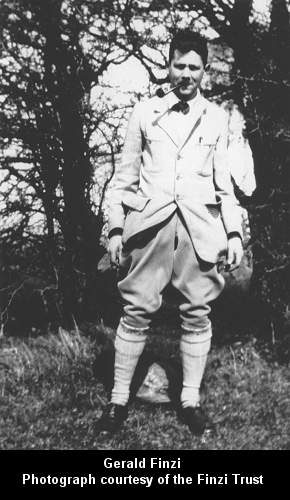|

A home-coming
PHILIP LANCASTER was at Gloucester
for the UK's 274th Three Choirs Festival
Why should it be this year, the first of the new millennium, which has
stood out and appealed to concert promoters throughout Britain to celebrate
British music? Malcolm Arnold's eightieth birthday has passed un-noticed;
likewise Edmund Rubbra's centenary. In contrast the centenary of the birth
of Gerald Finzi has been marked universally, with over two hundred performances
taking place worldwide. It is perhaps the high-profile nature of these centenary
celebrations which have inspired promoters to explore the British musical
landscape; Finzi, with his Italian name and Jewish background, would have
been proud to have been placed so firmly in the English genre.

That the Gloucester Three Choirs Festival should mark British music thus
is, in many ways, a home-coming. Gloucestershire is one of the homelands
of English music from the nineteenth century renaissance onwards: Parry,
known as one of the fathers of English music as we know it (the other being
Stanford) came from just outside Gloucester; Vaughan Williams, Herbert Howells
and Ivor Gurney are all Gloucestershire lads. The latter two used to walk
on Chosen Hill, Gloucester, discussing music and poetry; Finzi lived in
Gloucestershire for a time, and it was in 1956 on Chosen Hill with Vaughan
Williams showing him where he found his inspiration for his Christmas work
In Terra Pax, that Finzi caught his final, fatal, illness. Similarly,
the Three Choirs has always been a part of a great tradition, this year's
festival being the 274th, and was in the first half of the twentieth century
a great meeting ground for English musicians:notably, Parry, Finzi and Elgar.
The traditional opening service of the festival was this year held in
the morning. Prior to the service David Briggs directed Ian Ball (organ)
and the Philharmonia brass in Marche Héroïque by Herbert
Brewer (former Gloucester organist, friend of Elgar and teacher of Howells
and Gurney), an Elgarian Pomp and Circumstance style march and orchestrated
in a splendid manner (again Elgarian in places) by Edward Marsh (surely
not Winston Churchill's one time Secretary, Rupert Brooke's mentor and a
great supporter of the arts?!). Elgar's Severn Suite and a rousing
performance of Handel's Ode to St Cecilia brought us into the service:
canticles by Stanford and Britten; some perhaps over-indulgent choral acclamations
by David Briggs; a brilliant fanfare to the National Anthem by Herbert Howells,
all the more poignant in its suppressed majesty; the service coming to a
close with an arrangement by Briggs, again for organ and brass, of Walton's
resplendent Crown Imperial. Only one question: was I the only person
in the building to whom the last hymn was unknown? Perhaps music should
have been supplied as it was for the first, much better known hymn.
Gloucester's St Mary de Lode Church is quite a fortune for the Three
Choirs: very local to the Cathedral, acoustically very fresh and open, and
the setting for an excellent and diverse series of recitals. The opening
recital found its first interloper in the British landscape: Felix Mendelssohn,
perhaps forgiven having been a frequent visitor here. Whether interloper
or otherwise, one can never shirk at hearing a performance of his youthful
Octet, excellently delivered by the Emerald Ensemble. This was preceded
by Howells' playful programming in his rarely heard Lady Audrey's Suite
and Vaughan Williams' Phantasy Quintet.
Continue >>
Copyright © 20 September 2001
Philip Lancaster, Chosen Arts, Bristol, UK
 THE THREE CHOIRS FESTIVAL WEBSITE
<< Music
& Vision home
The Woman by the Sea >>
THE THREE CHOIRS FESTIVAL WEBSITE
<< Music
& Vision home
The Woman by the Sea >>
|

